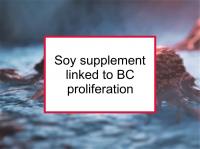Soy supplements are marketed as safe substitutes for hormone replacement therapy (combined HRT), or menopausal hormone therapy, to relieve menopausal symptoms such as hot flashes and bone loss. Such supplements contain soy isoflavones (genistein and daidzein), which are compounds with estrogenic properties.
Soy supplements have also been suggested as a strategy to reduce breast cancer risk since population studies that have found reduced breast cancer rates among women with high intake of soy foods. However, studies for the most part have reported that soy isoflavones are not effective in reducing menopausal symptoms and have raised the possibility that their use by some women could increase the risk of breast cancer recurrence. Now a new study has reported that soy supplements increase expression of harmful genes in tumor tissue of breast cancer patients.
Soy supplements are not useful
A number of studies have reported that genistein and daidzein supplements are not successful in relieving menopausal symptoms. Not all studies are in agreement, but such supplements appear to be ineffective in reducing hot flashes and vaginal dryness, or preserving bone mineral density, mental acuity or thyroid function.
Soy isoflavone supplements appear to introduce increased risk of breast cancer recurrence in some women. High intake of soy isoflavones have been reported to increase the risk of cancer recurrence in HER2-positive (HER2+) breast cancer patients. Several studies have found that genistein interferes with the effectiveness of tamoxifen. One study also reported that soy-based supplements might reduce the efficacy of breast cancer treatment with aromatase inhibitors.
Latest research finds soy isoflavones may promote proliferation
The study referenced at the beginning of this news story was designed to investigate the effects of soy supplementation on breast cancer-related genes and signaling pathways. The study included 140 women with early stage breast cancer who were assigned to two groups of 70. The soy group received a soy protein supplement for seven to 30 days between diagnosis and surgery. The remaining group received a placebo.
The authors confirmed that circulating genistein and daidzein rose in the soy group, but not in the placebo group. Gene expression, proliferation and apoptosis (programmed cell death) were assessed in both pretreatment and posttreatment tumor tissues.
Some genes were discovered to have altered magnitudes and directions of expression as a result of soy supplementation. The authors identified a high-genistein signature consisting of 126 differently expressed genes. This signature was characterized by overexpression (more than two-fold) of cell cycle transcripts, including those that promote cell proliferation. On the other hand, soy intake did not result in statistically significant changes in Ki-67 or the apoptosis marker Cas3.
The authors conclude that soy intake and high circulating genistein is associated with genes that drive cell cycle and proliferation pathways. These findings raise the possibility that soy supplements could adversely affect breast cancer gene expression in some women, according to the authors.
Please see our articles on genistein and daidzein and soy protein isolate for more information.
